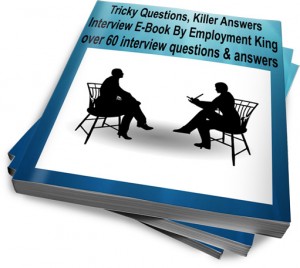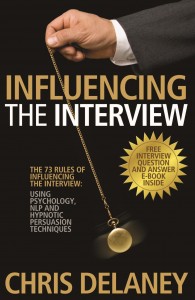Interview Skills
I wanted to share an e-mail I recently received regarding getting out of tricky interview questions on experience for applicants with little or know job experience
Hi Chris
I was really impressed with your influencing the interview book, there are so many exciting techniques hidden that after I read it for the second time I found more techniques that I missed the first time round. At the book end, you said that the reader can contact you with any questions. My question is; I’m a graduate and I will be applying for positions where the competition is vast and I know applicants with more experience then I will be applying, what language pattern would you recommend using to get around the question “tell me what experience you have in this sector?”
Thank you so much I look forward to your reply
Michelle
Hi Michelle
Thank you for your e-mail, I agree competition for positions is vast and as an applicant with little or no experience, a question around your experience is daunting. First the employer will know from your application the extensiveness of your experience and they have still invited you for an interview, which means you have recorded a key skill or value that the organisation deem important.
In the book we discussed using sales psychology in the job interview and using embedded commands which I have incorporated into the example answer below. You could also use a reframe “I have experience in this sector, but it’s not just about having experience down on paper, what’s more important is the impact you make and the value you add to team, at X company I A, B and C…”
“As someone who is passionate about (job sector) I decided while at university I would gain as much experience as I could, which I found highly beneficial. I recently worked for X company and was part of team working on X project, where I was responsible for X, Y and Z (add facts, figures and real stories here as explained in the book). A lot of people on my course preferred to study and party but for me instead of getting my kicks from partying, I really enjoyed working in a role that I’m passionate about and what was really exciting was being able to put the theory I learnt at university into practice. As you can probably imagine, I have a vast amount of knowledge, experience and passion that I can bring to your organisation, and as I am experienced (or knowledgeable) in X, which as you can imagine would be highly beneficial on the new government contract you have just won, as both projects rely on XXXX (add skill, knowledge or experience)”
So what you need to do is pick a key experience and chunk down – talk about the specifics and how it relates to the organisation you are applying for. This way they will soon forget or may generalise that you have more experience then you have.
Don’t fall into the trap of saying “oh, I only have a months experience in X” this negative line won’t get you anywhere, skim over the time period and talk about the value you add to the project/company and then relate it to the position you are applying for.
Hope this helps and good luck
Chris
If you enjoyed reading this article you will also enjoy reading:











